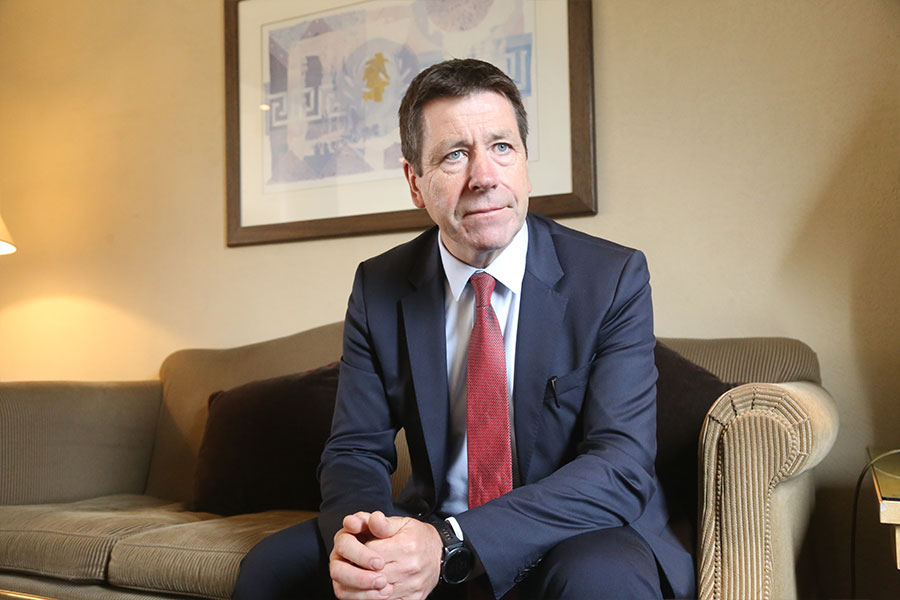
Radar | May 18,2024
Henok Mehari is a musician who founded the Mehari Brothers musical band in 2006. In addition to leading the popular musical group, which includes his siblings Robel, Lewam, and Halal, Henok is also well-known for hosting, producing, and directing the Musicology television programme, a show that spotlights the philosophy behind talented and creative musicians. Henok launched the programme out of the belief that there is very little space in the Ethiopian entertainment industry for music philosophy and the stories behind tunes and melodies.
Musicology was launched in 2019 and first aired on Kana TV. The show, however, made the switch to DStv's Abol TV channel earlier this year.
Henok, who says that he shifted to DStv because it was the only choice he had after resigning from Kana, has received multiple complaints from his viewers, who argue that they will not have the access they were used to once the show begins airing on a pay-TV platform requiring them to pay a monthly subscription fee.
Even though Henok knew that he might lose some viewers after leaving Kana, he thinks it is a step in the right direction, supposing that pay-TV outweighs the drawbacks of losing viewership for artists like him. The pay-TV system is not harmful, according to Henok, who argues that it is a tool that will help elevate art to the level it deserves in a country where artists have a difficult time gaining recognition and monetising their work.
“After a certain period of time and coordination, it is clear that the Ethiopian TV industry is going to shift to the scheme of pay-TV because our art also needs the growth we see in other nations,” Henok told Fortune.
Subscription television first started in Ethiopia about 25 years ago, when the South African MultiChoice introduced its DStv service to the market. Since the concept of pay-TV was a novel idea at the time and there was no policy framework as to licensing and broadcasting, it was difficult for them to set up. In addition, the service encountered resistance from the public, which was reluctant to sign up for what they thought of as an extravagant product due to its relatively high prices.
Eventually, after it broadened its content and services, it got closer to the community and became more affordable, offering five packages with prices ranging from 220 Br to 2,600 Br monthly. The service has since grown but the management at MultiChoice Ethiopia Plc, the sole distributor for DStv, were reluctant to say just how much. According to techcentral.co.za, a South African technology news website, MultiChoice had around 19 million subscribers across Africa at the end of 2019, with the majority being from South Africa. The company currently operates in 49 African countries.
Additionally, MultiChoice collaborated with the Ethiopian Broadcasting Authority in the latter's efforts to set up a legal framework, in the form of a proclamation, to govern pay-TV services in the country. Though this has made things simpler for those wishing to follow in MultiChoice's footsteps, not very many have managed to do so thus far.
Currently, there are four pay-TV distributors that are licensed by the Authority in accordance with a directive that was issued in 1999: MultiChoice Ethiopia Plc for the distribution of DStv; Bridgetech Plc for StarTimes; Bruh Entertainment Plc for CANAL+; and SNF Entertainment Plc for the distribution of KWESE TV.
With the exception of SNF Entertainment Plc, which was given its license in October 2018, they are all operational.
CANAL+, a subsidiary of the French CANAL+ Group, is the latest to join the pay-TV industry in Ethiopia.
StarTimes is a China-based broadcaster that came to Ethiopia in 2018 in anticipation of a large market in the pay-TV industry, according to Biruk Gebru, CEO of Bridgetech Broadcasting and Media Plc.
StarTimes offers four packages for local and international clients with prices ranging from 200 Br to 560 Br a month. However, it is more popular for its sports programming, airing content like the German Bundesliga, the Spanish La Liga, FA Cup, Spanish Copa Del Rey, Europa League, and NBA basketball.
“Currently, our big customers are families with kids, documentary lovers, and sports fans,” said Biruk.
StarTimes currently operates in more than 25 Sub-Saharan African countries with a subscriber base exceeding 15 million.
The latest to jump into the pay-TV market in Ethiopia is CANAL+, a subsidiary of the French CANAL+ Group, which has over 22 million subscribers worldwide. The company officially launched its services in the country in late April, 2021, over two decades after DStv pioneered subscription television in Ethiopia.
Bruh Entertainment, the sole distributor, chose CANAL+ because it has built up its success through its ability to design the pay-TV platform for local cultures and languages, for more than 30 years.
“We wanted to bring something different to the community," said Teodros Abraham, CEO of Bruh Entertainment.
Even though CANAL+ entered the pay-TV industry long after DStv, they faced similar challenges in setting up.
For one, free-to-air (FTA) channels have a huge influence in Ethiopia due to the country's proximity to free commercial satellites owned and operated by wealthy Middle Eastern countries. The public has long had free access to movies, music, and local channels through satellite operators like Arabsat, Eutelsat and Nilesat. All this without incurring any financial burden barring initial costs for decoders and satellite dishes, which can be acquired for around 1,300 Br at current market prices.
In addition, a lack of foreign currency, which is a bottleneck for the pay-TV business as it is for so many others, has been an obstacle. Ethiopia had less than three billion dollars in its foreign currency reserve last year, which was only enough to cover 2.5 months of the country's imports.
Though the licenses for the three operational pay-TV platforms have so far been issued in accordance with the directive from 1999, the new media law passed earlier this year has brought with it some motivational aspects, according to officials from the Ethiopian Media Authority. Recommending tax reductions, investment incentives like giving working space and loans, and including the broadcasters in the foreign currency supply chain are some of them.
"Even with the problems, the market is untapped and new players are welcome," said Biruk.
An estimated seven million households in Ethiopia have at least one television set and about 55pc of the population has partial access to television, but only five percent of the households that have access are subscribed to pay-TV services, according to Biruk. Compare that to the 1.4 million households subscribed in Kenya.
Regardless of the low figures, the pay-TV providers are confident they can get their viewership levels up, and they think they know just how to do it: producing local content.
"Local content is the magical formula for any pay-TV operator in the world," Biruk told Fortune.
DStv has been making strides in this regard. It began broadcasting the Ethiopian Premier League in December 2020 after inking a 13.5-million-dollar deal with the Ethiopian Premier League Share Company to stream the football matches for five years. It then launched its local-content-only Abol TV channel, where the Musicology programme currently airs weekly, in March 2021.
According to Ezana Wubishet, communication and PR manager at MultiChoice Ethiopia, they initiated the process of including Ethiopian content programmes early on but the implementation took time because they had to do their research and produce the quality and premium programming they were aiming for.
The content on Abol TV, which is purely an entertainment channel, is created based on the criteria, guidelines, and standards set by the production wing of DStv, M-Net. They are working with more than 30 producers to create new content, according to Ezana.
CANAL+ is also following suit. As a starting point, it has been bringing in foreign shows and movies and dubbing them into Amharic. It now produces nine in-house channels and distributes a set of local and international channels through two packages; Desta and Feshta, with subscription prices of 250 Br and 500 Br a month, respectively.
"For the moment, we have bought hundreds of local movies but we have plans to produce and co-produce new programmes as well," Teodros told Fortune.
But while the companies are shifting their gears to local programming, they are facing problems in finding quality local content.
“What actually matters is the content and creating a platform where local creative-space companies can be motivated," said Teodros.
Regardless of the challenges, the advent of pay-TV is undoubtedly creating job opportunities for many, and satellite dish installers were among those who expected to benefit from the situation. However, the installers are claiming that the impact pay-TV is having on their business is minimal.
According to Ayele Ashebir, technician of Ayu Dish, most of their current work consists of adjusting satellites for Ethiosat, and even that is not to a great extent.
Those involved in film production, art, and the like, seem to be a bit more upbeat about pay-TV though they too have their reservations.
According to Yared Kassa, training coordinator at Tom Videography and Photography Training Centre, which has been in business for almost two decades, the fact that foreign movies are being dubbed in Amharic by pay-TV service providers has both positive and negative effects.
The negative effects include drawing the attention of the audience completely to foreign art products and smothering the local industry, which is still in its infancy. However, it also shows local art professionals what the audience needs and what standards they should follow, explained Yared.
"They are a very loud alarm for the country's art industry," he told Fortune.
Moreover, he believes that even if pay-TV has limited reach in the country, the platforms are beneficial in that they are unveiling Ethiopia's art industry, along with the culture, to other places.
"Pay-TV will modernise art, along with its professionals, and that will lead to its acceptance as a normal commodity," said Yared.
PUBLISHED ON
Apr 30,2021 [ VOL
22 , NO
1096]

Radar | May 18,2024

Fineline | Apr 25,2020

Radar | Nov 23,2019

Radar | Apr 24,2023

Commentaries | Sep 16,2023

Fortune News | Apr 10,2021

Commentaries | Jun 13,2020

Commentaries | Dec 28,2019

Addis Fortune | Aug 01,2022

Commentaries | Jun 29,2019

Dec 22 , 2024 . By TIZITA SHEWAFERAW
Charged with transforming colossal state-owned enterprises into modern and competitiv...

Aug 18 , 2024 . By AKSAH ITALO
Although predictable Yonas Zerihun's job in the ride-hailing service is not immune to...

Jul 28 , 2024 . By TIZITA SHEWAFERAW
Unhabitual, perhaps too many, Samuel Gebreyohannes, 38, used to occasionally enjoy a couple of beers at breakfast. However, he recently swit...

Jul 13 , 2024 . By AKSAH ITALO
Investors who rely on tractors, trucks, and field vehicles for commuting, transporting commodities, and f...

Oct 18 , 2025
The political establishment, notably the ruling party and its top brass, has become p...

Oct 11 , 2025
Ladislas Farago, a roving Associated Press (AP) correspondent, arrived in Ethiopia in...

Oct 4 , 2025
Eyob Tekalegn (PhD) had been in the Governor's chair for only weeks when, on Septembe...

Sep 27 , 2025
Four years into an experiment with “shock therapy” in education, the national moo...